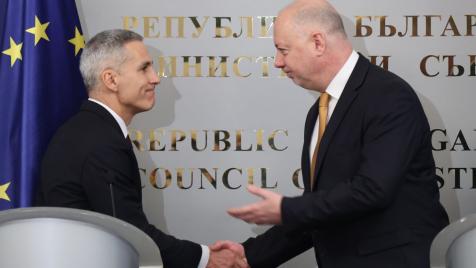The state of the national budget is visibly deteriorating
The deficit is growing rapidly, while VAT revenues are falling further and further behind the target
© ECONOMIC.BG / BTA
The budget deficit grew at an increasingly rapid pace, reaching BGN 4.3 billion at the end of July. This is equal to 2% of the expected size of the economy in 2025 and is only 1 percentage point away from the 3% target set in the budget, which would still allow Bulgaria to meet the Maastricht criteria.
However, the Fiscal Council itself does not believe this is possible and expects a deficit of at least 5 – 6% this year – something unseen since 2009, when Bulgaria was in the midst of the global financial crisis and entered a recession. Earlier on Monday, the chairman of the Fiscal Council, Simeon Djankov, said that with such poor management of public finances, tax increases are inevitable and he proposes that VAT be raised to 22%.
In just one month, the budget deficit has grown by nearly BGN 1 billion, while in the previous two months the increase was around BGN 700 million. As the year progresses, spending usually grows faster, with the largest payments being made in the last 2-3 months of the year. This gives reason to believe that the Fiscal Council's gloomy forecast is likely to come true.
This is also supported by the poor performance of projected revenues from indirect taxes, including VAT. As of July, these revenues amounted to nearly BGN 16 billion, or 14% more than in the same month of the previous year. If we go back to May and April, there was an annual growth of 16.1% and 14.6%, respectively. In June, the annual increase was 13.4%.
Finance Minister Temenuzhka Petkova promised that a few months after the adoption of the budget and the implementation of the planned revenue measures, VAT revenues would begin to grow more significantly and, ultimately, by the end of the year, the 33% annual growth that seemed unbelievable to public finance experts would be achieved. The measures took effect on May 1, i.e., three months ago.
However, the Ministry of Finance's press release states that "the actions taken by the revenue administrations to increase collection are already beginning to have an effect on VAT revenues." And this is despite the fact that before the measures to increase revenue collection and combat the gray economy were implemented, indirect tax revenues were growing at a faster rate than afterwards.
Total revenues, grants, and donations under the Consolidated Fiscal Program (CFP) as of July 2025 amounted to BGN 46,358.1 million, or 51.4% of the annual estimates. Revenues increased by 13.5% (BGN 5,511.3 million) compared to those reported in July 2024. This growth was mainly driven by tax revenues, which increased by 16.7% (BGN 5,418.1 million). Non-tax revenues increased by 12.9% (BGN 787.3 million) compared to the same period in 2024, while revenues from aid and donations decreased by BGN 694.1 million.
Expenditures under the Consolidated Fiscal Program (including the Republic of Bulgaria's contribution to the EU budget) as of July 2025 amounted to BGN 50.637 billion, which is 52.4% of the annual estimates. By comparison, CFP expenditure as of July 2024 amounted to BGN 41.82 billion, bearing in mind that in February 2024 a transaction was reported for the reimbursement of expenses from the foreign funds account of the Ministry of Regional Development and Public Works back to the ministry's budget in the amount of BGN 1.2 billion. When this transaction is eliminated for the sake of data comparability, expenditures at the end of July 2025 increase by BGN 7.62 billion (17.7%). The increase in expenditure is mainly in the area of social payments, including pension expenditure, as well as in personnel expenditure, capital expenditure, and others.
The fiscal reserve as of July 31, 2025, is BGN 19.8 billion, including BGN 18 billion in fiscal reserve deposits with the BNB and banks and BGN 1.8 billion in receivables from European Union funds for certified expenditures, advances, and others.
Translated with DeepL.

 Georgi Zhelyazkov
Georgi Zhelyazkov 




